World
‘Meaningful work’: Volunteers clean Ho Chi Minh City’s fetid canals by hand
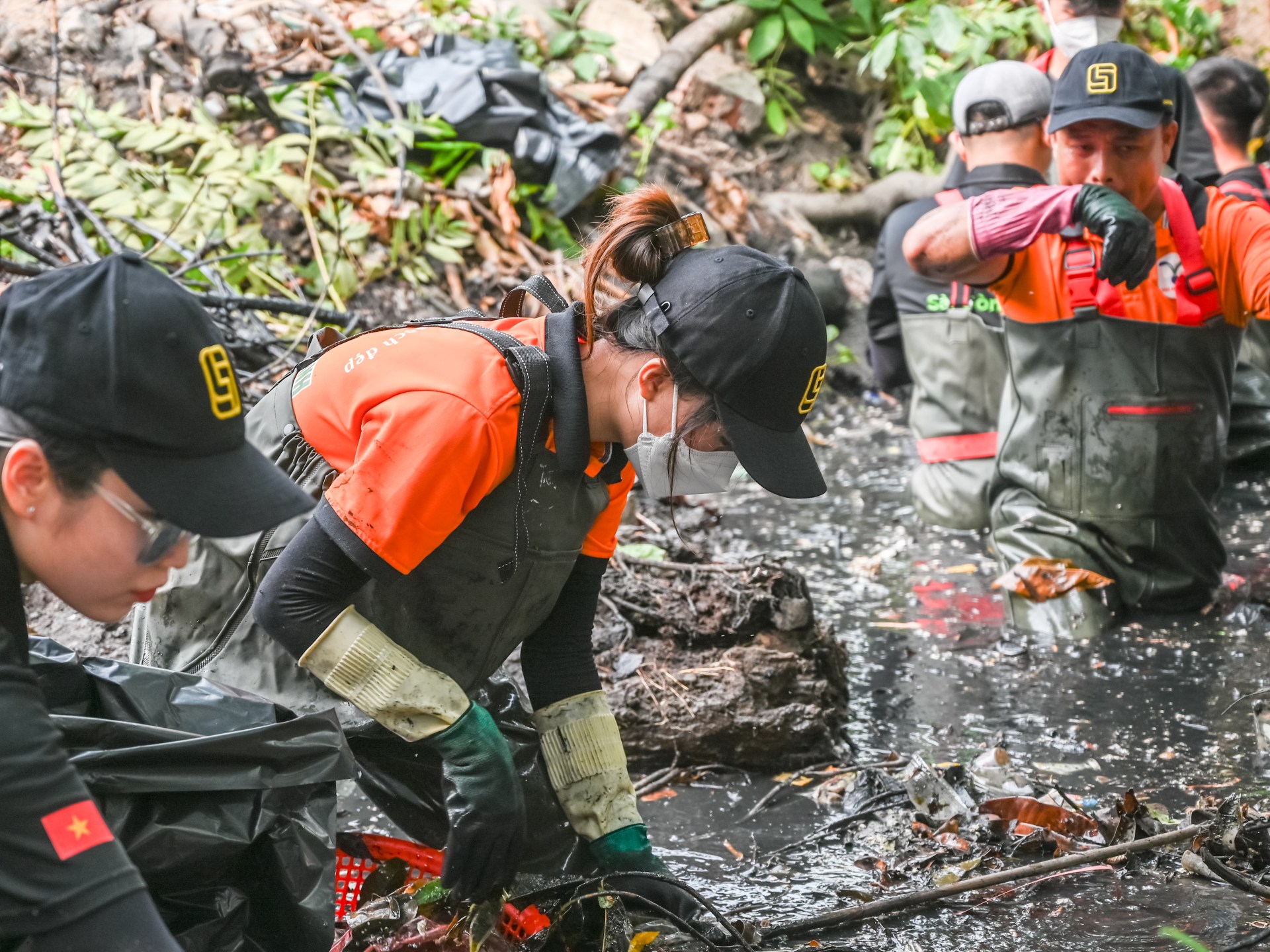
Ho Chi Minh City, Vietnam – It is barely 7am when Nguyen Luong Ngoc and his team of young volunteers meet in the depths of District 12 in Ho Chi Minh City.
A vast pile of takeaway breakfast boxes waits on one side of the narrow road. Behind them lies a stinking canal stuffed with rubbish; its water black and barely moving.
As each volunteer arrives and grabs a box of food, the mood lifts. Everyone is smiling, cracking jokes despite the smell and the mess.
Eventually, a truck pulls up carrying a load of waterproof dungarees and other equipment. The team get into the green rubber suits, spray themselves with mosquito repellent, put on long gloves and wade into the water.
Ngoc and the other volunteers at Sai Gon Xanh – which translates to ‘Green Saigon’ – run regular sessions like these; cleaning up waterways around Vietnam’s biggest city by hand, pulling the rubbish from the water and leaving it in bin bags for waste collectors to remove.
Nhu Van Hoa joined the team a few months ago and is now a regular. Having picked his way through water thick with putrid, rotting food waste, he holds up his glove-covered hands, drenched in black filth.
“I use three layers of gloves,” he said.
The work might be risky, smelly and unpleasant, but there are now hundreds of people like Hoa who join the gatherings in the hope that they can inspire change among the more than 10 million residents of Ho Chi Minh City, once known as Saigon.
The cleanups take place between three and five times a week, and on the weekend, the group tries to rope in as many people as possible.
“On Sundays, that’s when we call everyone – as many volunteers as we can get – roughly about 100 to 200 people, to do the cleanup,” Ngoc told Al Jazeera.
Most of the volunteers are university students, restaurant staff or motorbike taxi drivers, and have irregular schedules, so Sai Gon Xanh creates a flexible timetable to give them all the opportunity to participate.
Another volunteer, Hoang Thi Thanh Nga, is just 20 years old. She joined the Sai Gon Xanh team because she wanted to contribute to her city.
She says the water is not cold at this time of the year, and volunteers get used to the smell.
The length of time spent cleaning up depends on the location. “In some places, one session is enough which is around three to four hours,” said Ngoc. “Sometimes it’s a whole day or two, three days, it depends on the site.”
No official recycling system
Ho Chi Minh City produces about 9,500 tonnes of domestic rubbish every day and there is little in the way of formal recycling.
The city’s two main landfills are rapidly reaching capacity and authorities are looking to incineration and the conversion of waste into energy as potential ways forward.
“Despite being the commercial capital of the country, there is no official urban waste recycling system in Ho Chi Minh City,” Bijeesh Kozhikkodan Veettil, an expert in remote sensing, GIS and environmental research at the city’s Van Lang University, told Al Jazeera. “Instead, the local government depends on small companies for waste management in the city.”
The Sai Gon Xanh team usually chooses a ward to clean up and then contacts the local government representatives to seek their permission. They also ask for advice on which locations are most in need of their help.

The cleanups typically take place in the mornings when the sun is not too strong and the air is still comparatively cool. The team gathers, and the suits – provided by Sai Gon Xanh – are distributed.
But while the suits look impressive, they go only a small way to protecting the volunteers from the dangers of their work.
“The rubber suit is what we bought at the small factory store,” said Ngoc. “They are normal rubber … and just [make the work] a little bit less dangerous.”
The volunteers face serious health risks from the rank waterways.
“If you’re negligent, you could die,” said Ngoc. “It causes a lot of skin problems … intestine problems, lung problems, so it does affect a lot with regards to health.”
There is also the risk of stepping on a needle while working in the rivers, he said. The team all take regular anti-HIV medication to lower the risk of infection.
“This helps prevent roughly up to 70 – 80 percent [of HIV infections],” said Ngoc, adding that the volunteers also stay up to date with vaccinations for as many other diseases as possible.
A mindset shift
But for the Sai Gon Xanh volunteers, the risk is worth it.
“Every time we have finished cleaning up the canals, I feel very happy,” Hoa told Al Jazeera.

According to Hoa, many people in Ho Chi Minh City have little awareness of the consequences of littering.
A lot of this comes down to a culture of convenience, according to Ngoc.
“[There are] a lot of hawkers, street food vendors, and they use a lot of these one-time-use products, like plastic bags [and] utensils,” he said. “There are not a lot of garbage bins around the city, so that’s why there’s a habit of people just throwing it as is convenient for them.”
This is particularly true of the migrants who come to the city from other parts of the country and do not stay long enough to see the effect of persistent littering, he added.
The Sai Gon Xanh team says the government has intervened, with heavy fines for offenders, billboards and other means to spread awareness.
The government also actively cleans up sites around the city, Ngoc said, but because they use machines and work quickly, people do not realise how significant the litter problem is. People also simply assume that the government will clean up their mess, he added.
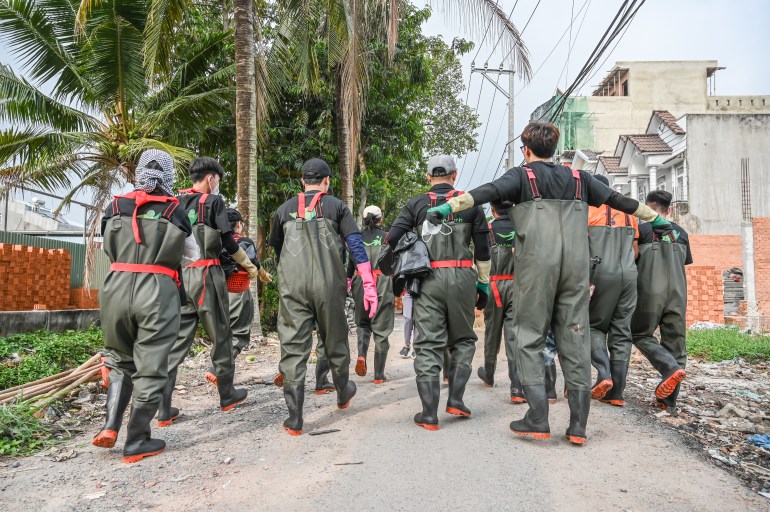
“That creates a habit of just throwing it, and someone will pick it up,” said Ngoc. “We record content about our work and put it online so that when … we do it by hand and people see [our] images and footage, they get touched [and] maybe, on some unconscious level, it helps them refrain from throwing [rubbish].”
In the past four to five months, Sai Gon Xanh has cleaned up roughly one tonne of rubbish across more than 100 canals around the city.
“It’s very meaningful work,” said Nga. “When we do it – yes, of course, it’s not nice – but then after, when we see the canals are cleaner, I feel very happy.”

World
Zelenskyy alleges China is pressuring countries against peace talks
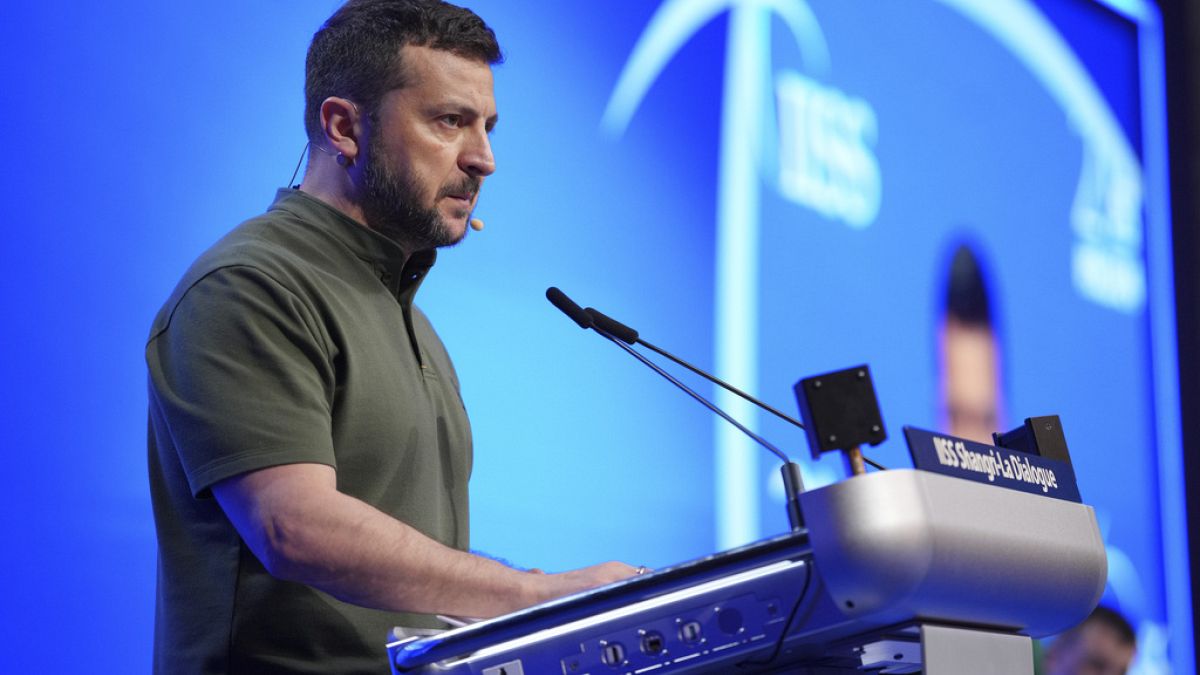
In a news conference at the Shangri-La defence forum in Singapore, Zelenskyy said that China is pressuring other countries and their leaders not to attend the upcoming talks.
Ukrainian President Volodymr Zelenskyy accused China of helping Russia to disrupt a peace conference on the war in Ukraine.
In a news conference at the Shangri-La defence forum in Singapore, Zelenskyy said China was pressuring other countries not to attend the upcoming talks in Switzerland.
“Russia, using Chinese influence in the region, using Chinese diplomats also, does everything to disrupt the peace summit,” he said, “This is unfortunate that such a big, independent, powerful country as China is an instrument in hands of Putin.”
During the conference, Zelenskyy urged top defence officials to attend the summit – saying he was disappointed at the failure of some nations to commit to joining.
He also said Ukraine had proposals to make at the summit – addressing nuclear security, food security and the release of prisoners of war.
Zelenskyy also said Ukraine is “ready to hear various proposals and thoughts that lead us to an end of the war and a sustainable and just peace.”
World
Video: How Internet Access Is Transforming Life in This Amazon Tribe

Since September, the Marubo, an isolated Amazon tribe, were connected to high-speed internet through Elon Musk’s Starlink. Jack Nicas, The New York Times’s Brazil bureau chief, visited the tribe’s remote Indigenous villages to see what the internet has changed for them.
World
Russia not 'bluffing' with nuclear threats as Biden greenlights limited military strikes, Medvedev says
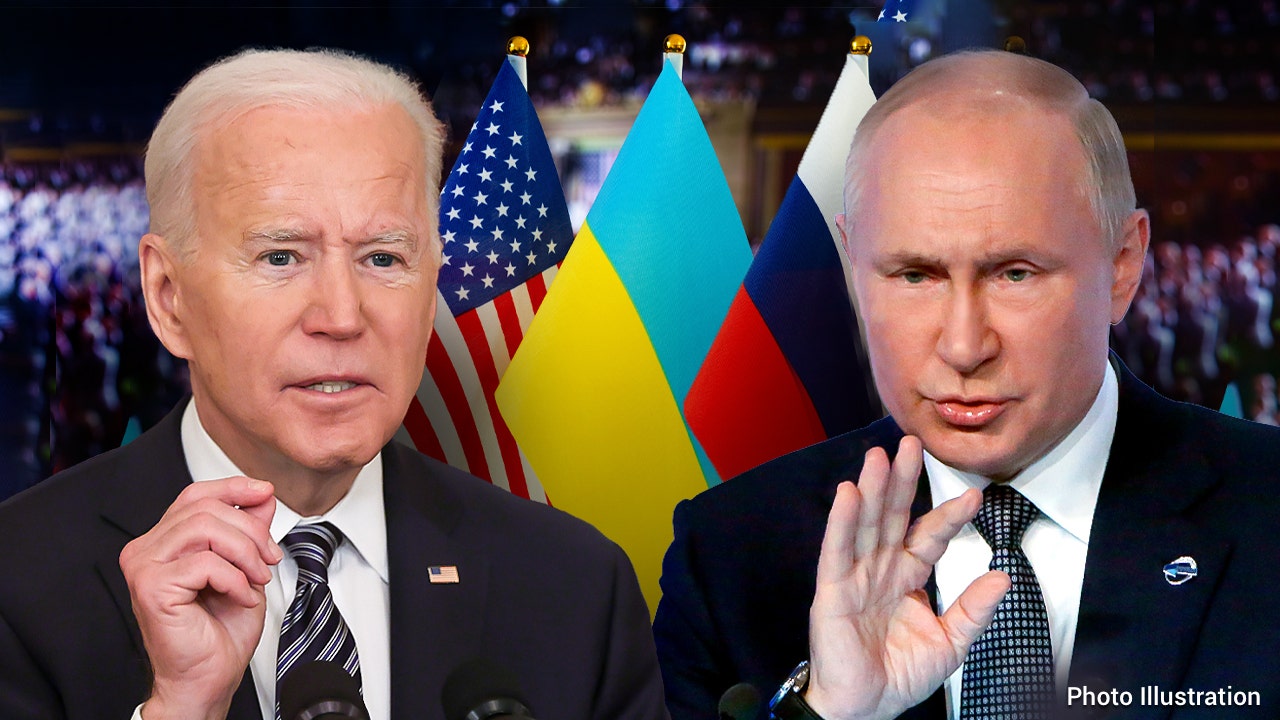
A senior ally of Russian President Vladimir Putin says Russia is not bluffing about using tactical nuclear weapons against Ukraine and warned that the conflict could spill over into other countries.
Dmitry Medvedev, the deputy chair of the Security Council of Russia, made the comments after President Biden quietly authorized Kyiv to launch U.S.-supplied weapons at military targets just over the border in Russia that are supporting an offensive against the northeastern Ukrainian city of Kharkiv.
“This is, alas, neither intimidation nor bluffing,” Medvedev said Friday, speaking on the potential to use strategic nuclear weapons, per Reuters.
UKRAINE SEEKS TO STRIKE RUSSIAN TARGETS WITH WESTERN WEAPONS, ZELENSKYY SAYS
Dmitry Medvedev, a senior ally of Russian President Vladimir Putin, right, says Russia is not bluffing about using tactical nuclear weapons against Ukraine and warned that the conflict could spill over into other countries. President Biden, left, quietly authorized Kyiv to launch U.S.-supplied weapons at military targets just over the border. (Photo by Alex Wong/Getty Images | Photo by Mikhail Svetlov/Getty Images)
Russia has been using staging locations just across the border to enable its attacks against Ukraine and Biden has given Ukraine the go-ahead to use American weaponry to hit back at Russian forces hitting them or preparing to hit them. Germany has also backed the move.
The White House says the policy is limited and prohibits the use of army tactical missile systems (ATACMS) or long-range strikes inside Russia.
In March, the U.S. quietly delivered long-range ATACMS to Ukraine for the first time – which the Ukrainians have since deployed against Russian military forces inside Ukraine.
Medvedev said Friday that “Russia regards all long-range weapons used by Ukraine as already being directly controlled by servicemen from NATO countries.”
“This is no military assistance, this is participation in a war against us. And such actions could well become a casus belli (an act that provokes a war),” Medvedev said Friday, per Reuters.
Medvedev, who served as Russian president from 2008 and 2012, said that the West’s ongoing support of Ukraine could lead to an escalation of the 27-month-old full-scale invasion.
“The current military conflict with the West is developing according to the worst possible scenario. There is a constant escalation when it comes to the firepower of NATO weapons being used. Therefore, nobody today can rule out the conflict’s transition to its final stage,” Medvedev said.
KYIV’S FORCES ARE UP AGAINST A CONCERTED RUSSIAN PUSH IN EASTERN UKRAINE, A MILITARY OFFICIAL SAYS
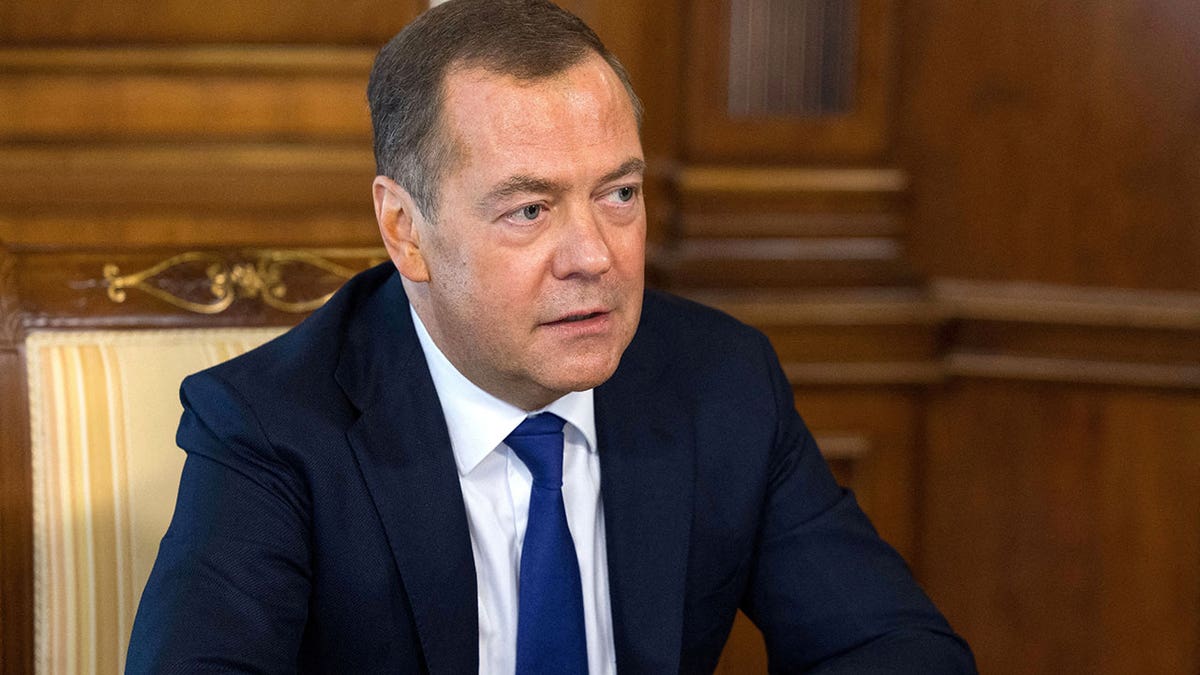
Dmitry Medvedev, the deputy chair of the Security Council of Russia, speaks during an interview with Russian media at a residence outside Moscow, Russia, on March 23, 2023. (Sputnik/Yekaterina Shtukina/Pool via REUTERS)
The comments come as depleted Ukrainian troops are losing ground in the war – and just weeks after the U.S. agreed to send an extra $60 billion in aid to the war-torn country. In the border region of Kharkiv, Ukraine has endured a Russian onslaught this month that has stretched Kyiv’s outgunned and outmanned forces.
The White House says that Russia’s forward progress has stalled and that Russia will not be able to capture Kharkiv.
Russia has only moved forward by a few kilometers and its forces are under relentless barrage by the Ukrainians and suffering at an extraordinary cost, the White House tells Fox News.
Ukrainian President Volodymyr Zelenskyy said Friday that it’s only a matter of time before Ukraine utilizes the Western weaponry to strike Russian territory.
The developments and threats of escalation came just weeks after Gen. Charles Brown, the Chairman of the Joint Chiefs of Staff, said NATO military trainers will eventually be sent to Ukraine, according to a report in the New York Times.
Ukrainian officials have asked their U.S. and NATO counterparts to help train 150,000 new recruits closer to the front line for faster deployment, per the report.
Rep. Eli Crane, R-Ariz., told Fox News Digital at the time that deploying military trainers would lead to a wider war in the region.
Friday’s comments by Medvedev are not the first time he has taken a hardline stance against the West. In January, he warned the U.K. that putting boots on the ground in Ukraine would amount to a declaration of war against Russia.
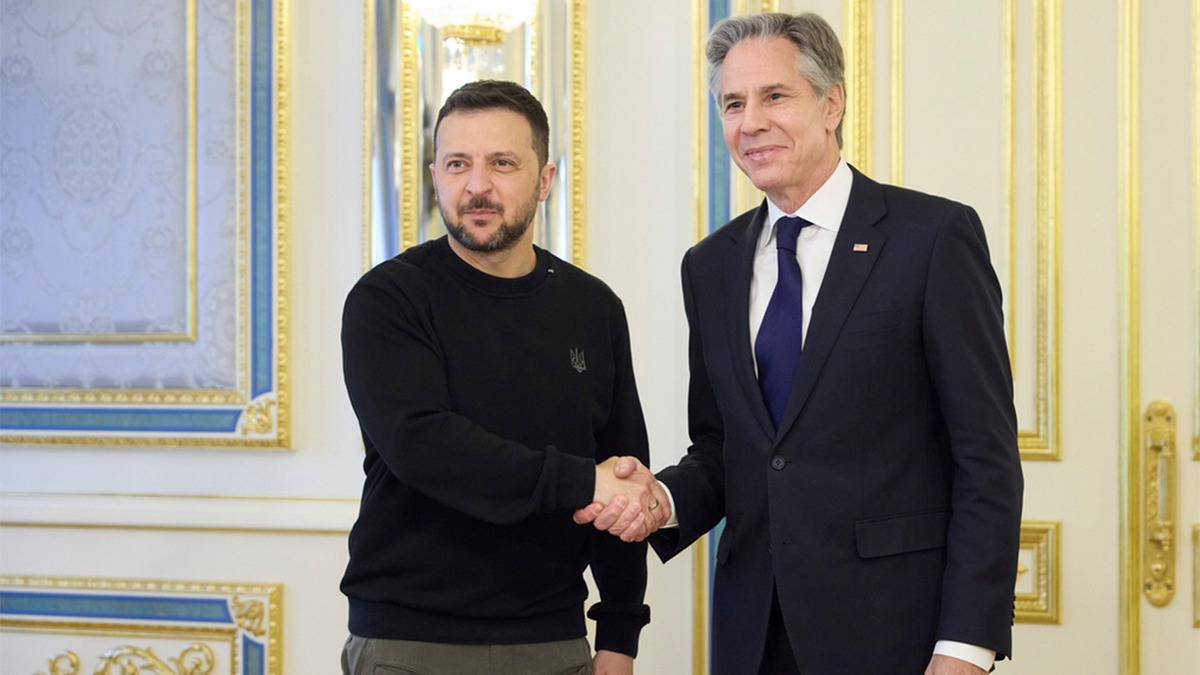
Ukrainian President Volodymyr Zelenskyy, left, greets Secretary of State Antony Blinken, right, prior to their meeting in Kyiv on May 14, 2024. (Ukrainian Presidential Press Office via AP)
In January, he also raised the prospect of nuclear war, warning NATO allies that a defeat for Russia in Ukraine could provoke a nuclear war.
“The loss of a nuclear power in a conventional war can provoke the beginning of a nuclear war,” he said in a Telegram post.
“Nuclear powers have [never] lost major conflicts on which their fate depends,” the Kremlin official added.
Fox News’ Jennifer Griffin, as well as Reuters and The Associated Press contributed to this report.
-

 News1 week ago
News1 week agoRead the I.C.J. Ruling on Israel’s Rafah Offensive
-

 News1 week ago
News1 week agoVideo: Protesters Take Over U.C.L.A. Building
-

 World1 week ago
World1 week agoHoping to pave pathway to peace, Norway to recognise Palestinian statehood
-

 News1 week ago
News1 week agoLegendary U.S. World War II submarine located 3,000 feet underwater off the Philippines
-

 World1 week ago
World1 week agoFamilies of Uvalde school shooting victims sue Microsoft, Meta and gunmaker
-
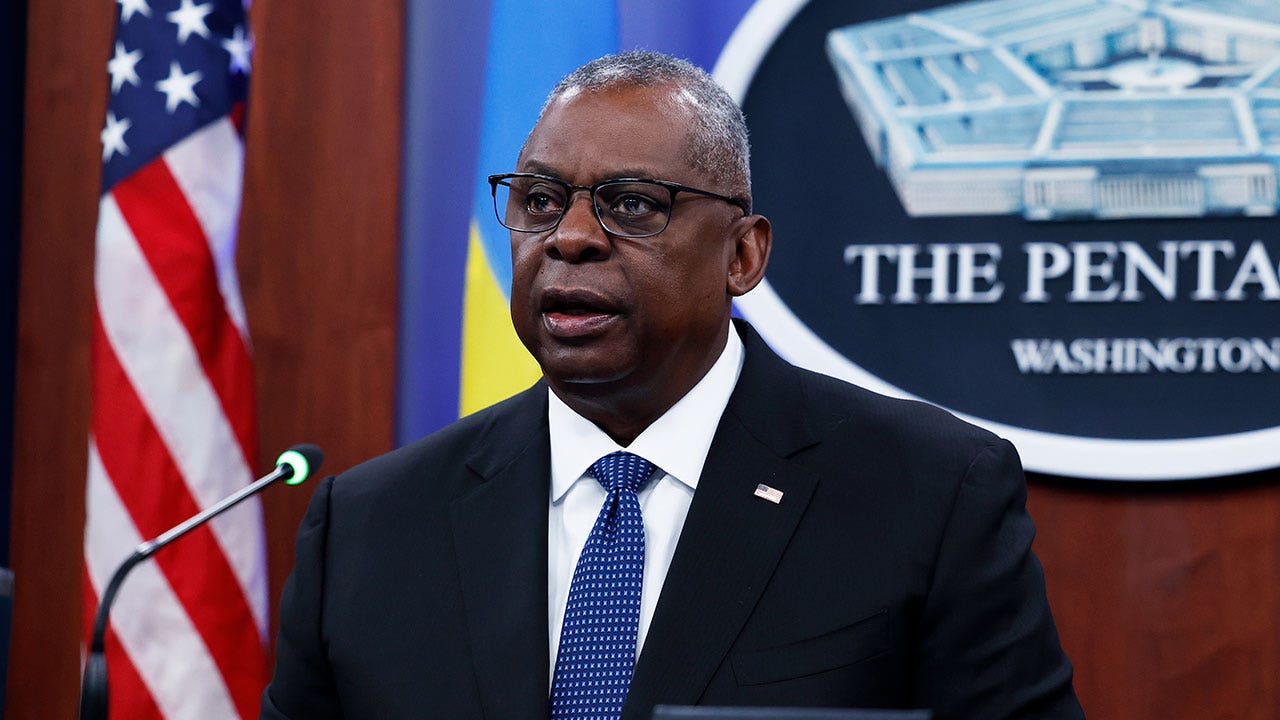
 Politics1 week ago
Politics1 week agoDefense Secretary Lloyd Austin to undergo nonsurgical procedure, Deputy Kathleen Hicks will assume control
-

 Politics1 week ago
Politics1 week agoHunter Biden attends pre-trial hearing in Delaware court on federal gun charges
-

 News1 week ago
News1 week agoHere are three possible outcomes in the Trump hush money trial : Consider This from NPR


















